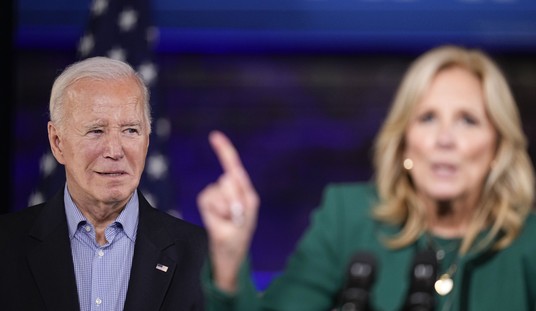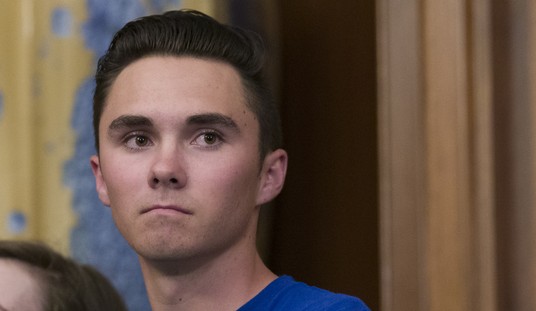Back in 1948, a certain Mr. E. Blair wrote:
Winston was smoking a Victory Cigarette which he held carefully horizontal. The new ration did not start till tomorrow and he had only four cigarettes left. For the moment he had shut his ears to the remoter noises and was listening to the stuff that streamed out of the telescreen. It appeared that there had even been demonstrations to thank Big Brother for raising the chocolate ration to twenty grammes a week. And only yesterday, he reflected, it had been announced that the ration was to be reduced to twenty grammes a week. Was it possible that they could swallow that, after only twenty-four hours? Yes, they swallowed it. Parsons swallowed it easily, with the stupidity of an animal. The eyeless creature at the other table swallowed it fanatically, passionately, with a furious desire to track down, denounce, and vaporize anyone who should suggest that last week the ration had been thirty grammes.
As a certain Mr. E. Morrissey quips in 2009, “All hail the jobless recovery!”
What a difference a (D) makes! In 2003-4, George Bush got derided for talking about economic recovery during the 2004 election campaign while unemployment declined from 6.2% to 5.6%. Critics derided it as a “jobless recovery,” including the Washington Post. Now, however, an increase in unemployment has become a measure of improvement in the economy as it goes up to 9.5%:
The big news of the week should be Friday’s employment report, which many analysts suspect will show that the labor market, while still quite bad, continues on a path toward stabilization. Economists are expecting the unemployment rate to rise to 9.5 percent, from 9.4 percent, and for employers to have cut 228,000 net jobs in August, compared with the 247,000 jobs lost in March. That job loss number — or even better, a figure that starts with a “1,” would be strong evidence that improvement in the economy is finally filtering through to the job market in a serious way.
But there are reasons to doubt that will happen. Most notably, the rate of new jobless claims has failed to come down significantly in recent weeks, which suggests businesses are still eager to pare back their payrolls. Thursday, the Labor Department said 570,000 Americans put in new claims for unemployment insurance benefits, down only barely from 580,000 the previous week.
Really! This is what the Post had to say in a news report from August 2004 about “jobless recovery”:
For President Bush, tax cuts have been an all-purpose elixir, a cure for budget surpluses and a bursting stock bubble, for terrorist attacks and boardroom scandals, for the march to war and a jobless recovery in peacetime.
Now, after three successive tax cuts, and after a record budget surplus has turned to a record deficit, the president faces an unenviable choice. He can either concede that his $1.7 trillion tonic has not worked as advertised, or he can insist that the economy is strong despite the slowdown in growth and job creation.
Unemployment at that time: 5.4%, down from 5.5% the prior month.
And yet in spite of their boundless praise for Big Barack’s glorious economic triumphs, as Jennifer Rubin notes, the Post is also “running an advice column for the floundering president: what is to be done?”
Jennifer writes:
Well, it’s never a good sign when mainstream papers are running symposiums to examine what, if anything, can be done to save the remainder of the president’s term.
If the problem is that the president is doing too much and stressing everyone out, then he should follow Donna Brazile’s advice and tell Americans not to worry about deficits, focus on health care (which is going to reduce the deficit or make it worse?), and get back to the bipartisan appeal that worked during the campaign. Harold Ford suggests that Obama downscale health-care reform and work on insurance regulation. But Newt Gingrich gets to the core issue and the real choice for the president:
Obama faces a choice: He can attempt to run a left-wing government against the American people. Or he can govern from the center with a large majority of Americans supporting him. He can have either his left angry or the American people angry. We will know in September which choice he has made.
And that is really what it’s all about. Analysts and pollsters will give suggestions on rhetoric or strategy, but Obama’s dilemma is a philosophical one. He’s shown himself to be a far-Left liberal, and the country doesn’t like it. He can keep at it and try to muscle through the top agenda items on the liberal wish list, putting at risk his congressional majority and his own popularity (what remains of it). Or he can swing back to the center, start over on health care, put aside cap-and-trade, come up with a tax-reform and tax-relief plan, and get serious about spending control. That would require a heartfelt realization that his agenda is too radical and will, over time, erode his standing and potentially render him a one-term president.
I suspect that so long as there are allies and advisers whispering in his ear that all he needs is some rhetorical tweaking, we won’t see anything approaching a substantive revision of his agenda. If the president doesn’t correct course, the voters may do it for him in 2010. But for now, don’t get your hopes up for a swing to the center. After all, Obama is being told, and no doubt believes, that the mantle of liberalism has been passed to him from Ted Kennedy. He won’t give it up—unless the voters force him to.
All of which may be why the American Thinker isn’t wasting any time issuing their assessment of President Obama’s ultimate legacy.










Join the conversation as a VIP Member